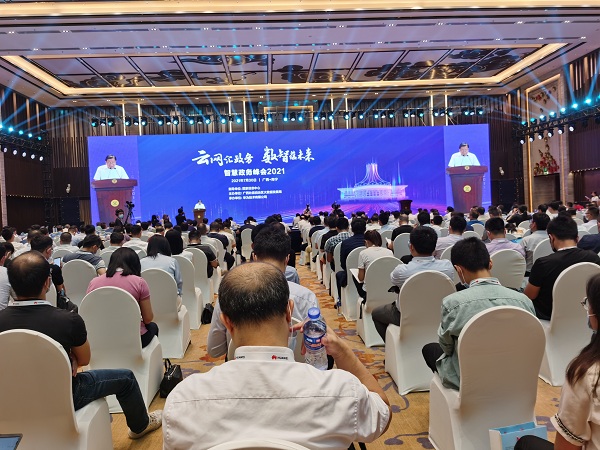Nanning holds e-government construction summit


The 2021 Summit for Smart E-government, which was jointly hosted by the Big Data Development Bureau of Guangxi Zhuang Autonomous Region and Huawei, kicks off in Nanning on July 30. [Photo provided to chinadaily.com.cn]
The 2021 Summit for Smart E-government, which was jointly hosted by the Big Data Development Bureau of Guangxi Zhuang Autonomous Region and Huawei, took place in Nanning, capital of Guangxi Zhuang autonomous region, on July 30.
The event gathered government officials and experts from the sector to discuss pressing issues related to smart government affairs services such as new development trends in digital government construction.
Wang Qinmin, vice-chairman of the 12th National Committee of the Chinese People's Political Consultative Conference, said in his speech that the construction of the digital government is vital for achieving the digitalization of government affairs services, driving high-quality and innovative socio-economic development, and modernizing China's system and capacity of governance.
Wang pointed out that a systematic construction of government data with a foundation of pursuing collaboration, participation and common interests, should be established to build a service-oriented government that people are satisfied with.
Guangxi has been pushing forward e-government construction in recent years and has ranked ninth countrywide in 2020 from the previous 28th spot two years before.
The region's online e-government platform currently allows people to handle 410,000 kinds of government affairs online, accounting for 62.57 percent of the total. Around 99.73 percent of government affairs can be handled within one single visit to the service counters after an online application is submitted.
Huawei has been making great efforts to help the digital and intelligent transformation of government affairs services with its cutting-edge technologies in 5G, cloud computing, big data, artificial intelligence and the block chain industry.
MOST POPULAR
- 1 China to give visa-free treatment to another 9 countries
- 2 China fully opens manufacturing sector to foreign investors in landmark opening up move
- 3 China's import expo attracts record-breaking participating countries, exhibitors
- 4 China's door opening even wider to foreign visitors, businesses
- 5 China revises rules to ease foreign strategic investment in listed firms
Editors' Picks
 Video:
Peru sees new port open
Video:
Peru sees new port open
 Infographic:
China's public holidays for 2025
Infographic:
China's public holidays for 2025
 Infographic:
Basic facts of APEC
Infographic:
Basic facts of APEC
 Infographic:
Wrapping up the 7th CIIE: Data recap
Infographic:
Wrapping up the 7th CIIE: Data recap



